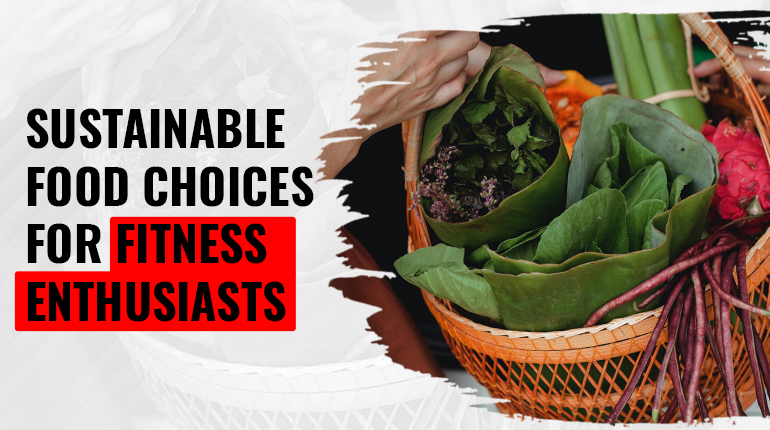Sustainable Food Choices for Fitness Enthusiasts

As fitness enthusiasts, we strive to fuel our bodies with the best possible nutrition. However, it's important to remember that our food choices not only impact our own health but also have a significant environmental footprint.

By making sustainable food choices, we can support both our fitness goals and the health of the planet. In this blog post, we will explore some key sustainable food choices that fitness enthusiasts can incorporate into their diets.
Nourish and Sustain: Eco-Friendly Food Choices for Fitness
From the gym to the kitchen, our commitment to sustainable living extends beyond the boundaries of our fitness routines. By taking a closer look at the sustainability of the foods we consume, we can actively contribute to the reduction of carbon emissions, the preservation of biodiversity, and the conservation of natural resources. Transitioning from a solely fitness-focused mindset to one that embraces sustainable nutrition allows us to become conscious consumers, making choices that align with our fitness goals and support a healthier planet.

In the following sections, we will explore various strategies for incorporating sustainable food choices into our diets as fitness enthusiasts. Let's embark on this journey together, where the synergy of fitness and sustainability leads us towards a more harmonious and resilient future.
1) Choose Plant-Based Proteins:

Legumes, such as lentils, chickpeas, and beans, are not only rich in protein but also high in fiber and other essential nutrients. Additionally, tofu, tempeh, and seitan are excellent plant-based protein sources for those following a vegetarian or vegan diet. By reducing our reliance on animal-based proteins, we can help minimize the environmental impact associated with animal agriculture, such as deforestation and greenhouse gas emissions.
2) Opt for Organic and Locally Sourced Produce:

Choosing organic fruits and vegetables reduces exposure to harmful pesticides and supports sustainable farming practices. Additionally, buying locally sourced produce reduces carbon emissions associated with long-distance transportation. Visit farmers' markets or join a community-supported agriculture (CSA) program to access fresh, locally grown produce.
3) Reduces Food Waste:
Food waste is a significant contributor to environmental degradation. As fitness enthusiasts, we can play a part in reducing food waste by planning our meals, properly storing leftovers, and utilizing food scraps creatively. Incorporate meal prepping into your routine to ensure you consume all the food you purchase and minimize waste. If you have excess food, consider donating it to local food banks or composting it to reduce landfill waste.
4) Support Sustainable Seafood Choices:

Overfishing and destructive fishing practices have led to significant declines in marine biodiversity. Look for seafood that is certified by reputable organizations such as the Marine Stewardship Council (MSC) or the Aquaculture Stewardship Council (ASC). These certifications ensure that the seafood is sourced responsibly and doesn't harm marine ecosystems.
5) Minimize Single-Use Packaging:
Fitness enthusiasts often rely on energy bars, protein powders, and other packaged products. However, these products often come with excessive single-use packaging that contributes to plastic pollution. Look for brands that prioritize sustainable packaging options, such as compostable wrappers or recyclable materials. Alternatively, consider making your own energy bars or protein snacks using bulk ingredients to minimize packaging waste.
6) Embrace Seasonal Eating:

Eating seasonally involves consuming fruits and vegetables that are naturally available during specific times of the year. By choosing local, seasonal produce, we reduce the energy required for transportation and storage, thereby minimizing our carbon footprint. Additionally, seasonal produce tends to be fresher and more flavorful, providing optimal nutrition for our fitness goals. Consider visiting farmer's markets or joining a community-supported agriculture (CSA) program to access a variety of locally grown, seasonal produce.
7) Reduce Meat Consumption:
While adopting a vegetarian or vegan lifestyle is a significant step towards sustainable food choices, even reducing meat consumption can have a positive impact on the environment. Animal agriculture is a resource-intensive industry that contributes to deforestation, water pollution, and greenhouse gas emissions. By incorporating more plant-based meals into our diets and choosing high-quality, ethically sourced meats when consumed, we can significantly reduce our ecological footprint.
8) Choose Sustainable Hydration:

Staying hydrated is essential for fitness enthusiasts, but it's equally important to consider the environmental impact of our beverage choices. Instead of relying on single-use plastic bottles, invest in a reusable water bottle and carry it with you wherever you go. Additionally, consider drinking tap water, as it is often rigorously tested and regulated. If you prefer filtered water, invest in a home water filter to reduce reliance on single-use plastic water bottles.
9) Support Local and Sustainable Food Systems:
By supporting local farmers and businesses that prioritize sustainable practices, we contribute to the growth of local food systems. Local food systems minimize transportation emissions, promote community resilience, and provide fresher and more nutritious food options. Look for farmer's markets, community-supported agriculture programs, or local food cooperatives in your area to connect with sustainable food sources.
Embracing Sustainable Food Choices for a Fit and Thriving Future:

As fitness enthusiasts, we have the power to make a positive impact on the environment through our food choices. By opting for plant-based proteins, choosing organic and locally sourced produce, reducing food waste, supporting sustainable seafood options, and minimizing single-use packaging, we can align our fitness goals with our commitment to the planet. By embracing sustainable food choices, we contribute to a healthier future for both ourselves and the environment.
 India
India UAE
UAE
-thumb.jpg)
-thumb.jpg)
-thumb.jpg)
-thumb.jpg)
-thumb.jpg)


-thumb.jpg)

-thumb.jpg)